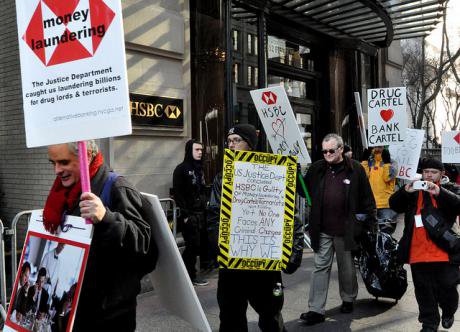
Flickr/Michael Fleshman. Some rights reserved.
The former Chief Political Commentator of the Telegraph, Peter Oborne, has made a number of serious allegations about the lack of editorial integrity at the Telegraph Media Group. He claims that Telegraph journalists have been prevented from pursuing investigations into stories which would harm the newspaper’s relationship with its major advertisers. The Telegraph has called his article an ‘astonishing and unfounded attack, full of inaccuracy and innuendo’. In response, Oborne has called for an ‘independent review’ of ‘the relationship [at the Telegraph Media Group] between advertising and editorial.’
This review is crucial in order to establish the facts: are Oborne’s allegations correct? But there is no publicly authoritative body available to conduct such a review, or to require it to be carried out. So who is responsible for this situation, in which advertisers are able to dictate terms to editors with apparent impunity?
The facts alone – if they are ever established – won’t take us very far. The commercial pressures on news publishers are only going to grow in a world of ever-declining print subscriptions and withering news stand sales. Advertising revenue is becoming increasingly important to publishers. Once, readers might threaten to boycott a newspaper. Now it is advertisers who have the power to shut it down.
Many people cheered when major brands withdrew their advertising from the beleaguered News of the World. They are not cheering at the prospect of HSBC using its buying power to set the news agenda. In one case, advertisers were bowing to public distaste at News International’s journalism. In the other, they are allegedly forcing a newspaper to seal its lips where their own distasteful practices are concerned. But these are two sides to the same coin.
Business models which put power into the hands of the few (advertisers), rather than the many (readers), are inherently vulnerable to commercial pressure. Couple this with a market in which the majority of national and regional papers are owned by a handful of men with wide-ranging business interests and you have a toxic combination.
We can’t shut our eyes and pretend this isn’t the reality of British print journalism. We may applaud the publishers who are pursuing alternative business models, such as the Bureau of Investigative Journalism, Positive News, The Conversation, openDemocracy and the many hundreds of hyperlocal publishers which are springing up across the UK. We desperately need the diversity which these publishers bring to a dangerously concentrated market.
But we also need to ensure that journalists at the major newspapers, which continue to set the national news agenda, have some safeguards against the imperatives of their owners and advertisers. The NUJ code includes a protection against any pressure to ‘distort or suppress information’, but this may not cut much ice in newsrooms which barely recognise the union’s existence. The Editors’ Code of Practice, the set of standards applied by IPSO (the Independent Press Standards Organisation), the Telegraph’s regulator, does not have anything to say on the subject. This now looks like a huge gap.
So the question is whether the Code should address the impact of advertising on editorial integrity. This principle is already recognised elsewhere: Ofcom regulates unsuitable sponsorship of television programming to avoid distortion of editorial content for commercial purposes. An independent body such as IMPRESS, which includes the voices of journalists, has an important contribution to make here.
More than this, we need to bring together advertisers, publishers, journalists and regulators to consider how best to protect the public interest in vigorous journalism, in a culture where so much of the agenda is filtered through commercial considerations. The solution to this problem may not lie with news publishers or their regulators alone. It may require us to work with the advertising industry and advertising regulators to develop a new advertising code of practice which ensures that big brands recognise the importance of media freedom. Societies with a higher degree of media freedom are more stable and secure environments in which to do business. Media freedom may not always suit advertisers in the short term, but it will protect them from corruption and political abuses of power in the long term.
News doesn’t come for free – despite the illusion of the internet. Serious journalism is expensive to produce. As a society, we need journalists who are properly trained, remunerated and supported throughout their careers. We need news publishers to thrive, on all sides of the political spectrum, if we are to sustain a vibrant public debate. But this doesn’t mean that we should tolerate anything that the market throws at us. If the business model of news publishing doesn’t allow for journalists to do their job, then that’s a problem for all of us. And we should all work to find the solution.
openDemocracy has launched an urgent appeal to help us keep publishing the stories others won't. Please give whatever you can here and share this widely.
Read more
Get our weekly email





Comments
We encourage anyone to comment, please consult the oD commenting guidelines if you have any questions.